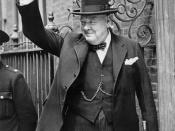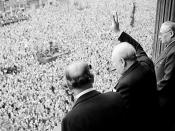Have you ever felt like a dog in cage? No matter how much you snarl or bark, no one will come and open the cage. It?s very much like if someone else controls your life. You can?t decide when you want to eat or go for a walk. You can only decide where you want to sit or lie down in the cage, you are living without any freedom. And even if you try to discover a secret exit from the cage, you will be vaporized.
This is exactly the feeling that the reader explores in the world created by Gorge Orwell in the book 1984. Characters are surrounded by the thought police everywhere they go. It makes it hard for anyone to act freely because there?s always someone watching.
It?s very ironic that Winston thought that Julia was a member of the thought police until she slipped him a note that said: ?I love you.?
Winston and Julia have no freedom or privacy. There are not many places where they can go where they are isolated from everything, where they won?t get caught being together. Winston and Julia are always afraid that someone has followed them. They are quite sure that Mr. Charrington?s shop is a safe hiding place for them to meet, and to have privacy, so they see each other there regularly.
In the first couple of chapters of part 2, it seems like they are able to break the rules by finding ways around them. But this is not the case as the thought police catch them. Another example of how controlled society is in 1984 is in the relationship between O?Brien and Winston. O?Brien started out as a friend of Winston?s, that?s why he wasn?t showing any suspicion towards him until O?Brien invites Winston to his flat to give him a copy of the Ingsoc dictionary. This meeting makes Winston realize that O?Brien, who is an inner party member, is an informer affiliated with the brotherhood.
People seem to be fighting the controls in the society by helping each other out. It appears that no one is getting caught by the thought police. But this is not the case.
Mr. Charrington, for example, seemed to be a character with integrity, yet he worked undercover for the ministry of the truth. He let Winston and Julia meet in secret in a little room upstairs from his shop. The couple thought everything would turn out well. Although Charrington seemed to be on their side, everything backfired. One day it became clear that he was part of the thought police when he arranged to have the two lovers surrounded by other policemen. The thought police then brought them to a prison where they were kept.
This shows that the controls in the society of 1984 are much stronger than they appear. In fact, the way people live in the book is comparable to prison, or like a dog in a cage. In prison, everywhere an inmate goes, a guard follows him. In the book, Orwell replaced guards with telescreens. Today, cities are starting to introduce cameras in high-crime areas. This system discourages thefts from occurring. And often, when you walk into a building there are many cameras that can follow you throughout your visit inside the building, and even outside. There are guards watching monitors who can alert other guards to come and question you if you are doing something suspicious.
Today, some Quebec cities have a device called: ?a red light box? which records the licence plates of cars that go through red lights. A camera takes a picture of the licence plate, and then the police send a ticket to the car owner?s house. These ways of making sure citizens obey the law are very effective but they can take away too much of people?s privacy.
For many decades in Russia, civilians were not allowed to speak against the government. As well, the government didn?t want information to circulate, for fear that too much knowledge among the people would surely make it fall. This fear of criticism and the attempt to limit the circulation of information are just like in 1984. The government of Russia feared a revolution, making it necessary to use propaganda to control the masses. This worked very effectively because the government could filter the information that it wanted the people to know, and especially what it didn?t want them to know.
For example, a scandal similar to the one involving former U.S. president Bill Clinton and a White House intern would have been prevented by the Russian government or by the government in 1984, because of the strong control over information and the media in both cases. People would have remained in the dark. But in North America today, since there are many different media outlets, everything gets out. The media can also be a very big source of propaganda, for example, in times of war. The media only report on what they think readers and viewers will want to know about, or what they think the public should know about. Too often, the media cover the same stories in the same way, making it hard to know what?s really going on. Most people never question decisions made by the authorities or wonder if they really know what the government is doing. Another problem is that more and more, the same companies own television stations and newspapers, making information sources more limited.
Even though things are not as bad as in 1984, or at least they don?t seem to be, tensions appear to be building up. People want to know what?s really going on and they want freedom, they don?t want to have television cameras watching them all the time.
People are starting to feel more and more like dogs in a cage as the 21st century unfolds, with almost every public place being monitored by security cameras. People have to watch what they do and what they say. Does this sound a bit like 1984? I?m afraid so.




